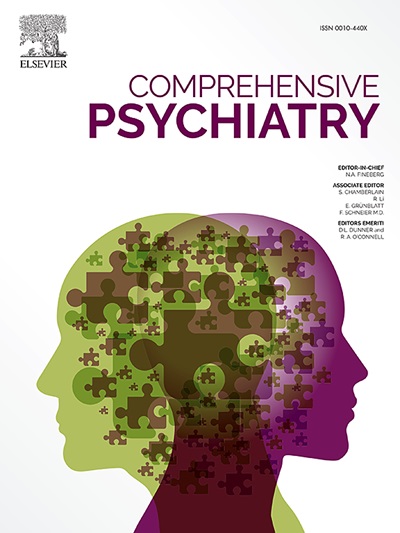确定与病程较长的精神病患者的临床、社会和个人康复最密切相关的因素。
IF 4.2
2区 医学
Q1 PSYCHIATRY
引用次数: 0
摘要
导言:大多数有关精神病康复的研究都集中在首次发病的人群中,使用发病前和基线数据来预测康复情况。然而,许多患者的病程较长,而且许多因素是动态的,在生活中会发生变化。目的:利用在同一次评估中测量的当前数据,研究与病程较长患者的临床、社会和个人康复以及康复变化评分最密切相关的因素:方法:使用最小绝对缩减和选择算子回归分析以及交叉验证来确定精神病患者临床(1054 人)、社会(1145 人)和个人康复(1187 人)(变化)的相关因素。随后,将确定的相关因素纳入单独的线性回归模型,检查确定变量的关联强度和模型的总体拟合度:结果:较好的临床康复与较好的社会和个人康复相关,在日常功能和社会关系方面遇到的问题较少。如果参与者有工作、日常生活中遇到的问题较少、负面症状较少、有生活伴侣且临床康复情况较好,则社会康复情况较好。个人康复与总体生活满意度提高、无抑郁情绪和临床康复程度提高有关。变化分值较小,波动也很小,没有发现与变化分值有显著关联:结论:对于病程较长的精神病患者来说,康复的各个领域相互影响,因此在治疗过程中应同等重视。本文章由计算机程序翻译,如有差异,请以英文原文为准。
Identifying factors strongest associated with clinical, societal and personal recovery in people with psychosis with a long duration of illness
Introduction
Most studies on recovery of psychotic disorders focus on first-episode populations using premorbid and baseline data to predict recovery. However, many patients experience a long duration of illness and many factors are dynamic and change during life.
Aims
To investigate factors strongest associated with clinical, societal and personal recovery, and recovery change scores in people with a long duration of illness using current data measured at the same assessment.
Methods
Least absolute shrinkage and selection operator regression analyses with cross-validation were used to identify the correlates of (changes in) clinical (N = 1054), societal (N = 1145) and personal recovery (N = 1187) in people with psychotic disorders. Subsequently, the identified associated factors were included in separate linear regression models, examining the associative strength of the identified variables and overall fit of the models.
Results
Better clinical recovery was associated with better societal and personal recovery, experiencing fewer problems with daily functioning and social relations. Participants had a better societal recovery when they were employed, had fewer problems in daily life, less negative symptoms, had a life partner and better clinical recovery. Personal recovery was associated with greater satisfaction with life in general, no depressive mood and increased clinical recovery. Change scores were small with minimal fluctuation and no significant associations with change scores were detected.
Conclusions
Recovery domains strongly influence each other in people with a long illness duration of psychosis and should therefore have an equally important focus during treatment.
求助全文
通过发布文献求助,成功后即可免费获取论文全文。
去求助
来源期刊

Comprehensive psychiatry
医学-精神病学
CiteScore
12.50
自引率
1.40%
发文量
64
审稿时长
29 days
期刊介绍:
"Comprehensive Psychiatry" is an open access, peer-reviewed journal dedicated to the field of psychiatry and mental health. Its primary mission is to share the latest advancements in knowledge to enhance patient care and deepen the understanding of mental illnesses. The journal is supported by a diverse team of international editors and peer reviewers, ensuring the publication of high-quality research with a strong focus on clinical relevance and the implications for psychopathology.
"Comprehensive Psychiatry" encourages authors to present their research in an accessible manner, facilitating engagement with clinicians, policymakers, and the broader public. By embracing an open access policy, the journal aims to maximize the global impact of its content, making it readily available to a wide audience and fostering scientific collaboration and public awareness beyond the traditional academic community. This approach is designed to promote a more inclusive and informed dialogue on mental health, contributing to the overall progress in the field.
 求助内容:
求助内容: 应助结果提醒方式:
应助结果提醒方式:


